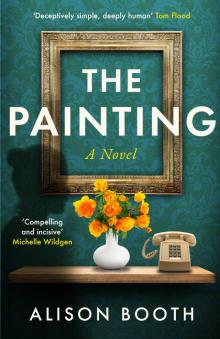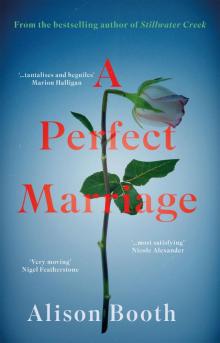- Home
- Alison Booth
The Painting Page 24
The Painting Read online
Page 24
Part VI
Sydney, January 1990
Chapter 33
Early morning. The automated doors beyond Customs and Immigration at Sydney’s Kingsford Smith Airport slid open and there was sweet Sally in a bright red dress and dark glasses, smiling and waving. She hugged Anika, hot and sweaty though she was, before grabbing one of her bags and they were off, out into the oblique sunlight that was so bright it hurt Anika’s eyes. The smell of aviation fuel diminished as they drove away from the airport. Anika noticed – as if for the first time – the sparkling leaves of the eucalyptus trees as they twisted in the golden light and the gentle breeze, and above them the cerulean blue of a sky that was already brilliant though it was not yet nine o’clock.
‘You haven’t changed,’ Sally said. ‘You’re a bit paler, that’s all.’
‘I feel like a different person.’
‘So you got what you wanted?’
‘Yes, and more.’
‘Do you want to talk about it?’
‘Not yet. Tell me what’s been happening here.’
Though Sally assured her that nothing had been happening, they were able to talk about that nonstop as Sally weaved an intricate path through the back streets of Tempe, Enmore, Annandale, until they got to Victoria Road. Here Sally had to concentrate, here she started swearing at the traffic, swivelling her head as she changed lanes, giving the finger to a driver who cut in front. That was when Anika shut her eyes and opened them again only when they were safely in Rozelle.
Boggabri Street was an oasis, although one with few parking spaces this morning. There was a large ‘For Sale’ sign in front of Mr and Mrs Opposite’s house. Tabilla’s front door was open and Anika would have sworn her grevillea had grown another ten centimetres in the few weeks she’d been away. Sally drove slowly by, muttering about parking. Mrs Thornton was already in her yard, leaning on her broom handle and chatting to Tabilla’s neighbour from the other side, the white-haired old man who was hard of hearing. Ty Nguyen’s ute was parked in its usual spot and was shining in the sunlight, with pools of soapy water on the bitumen around it. Before the dogleg in the road that led to the corner shop, Sally adroitly manoeuvred into a space in front of Penny and Jane’s terraced house and switched off the ignition.
In Anika’s bag was the little bottle of perfume she’d bought for Sally at Singapore Airport. Sally was enchanted by this, as Anika knew she would be; that enthusiasm and generous spirit were some of the reasons why she loved her. They carried Anika’s bags along the street as far as Mrs Thornton’s. The old man had moved on towards Victoria Road and Mrs Thornton was able to give Anika her undivided attention.
‘How pale you look,’ she said, ‘and so tired. That reminds me of a friend I used to have…’ and off she went, on an adventure into her past.
Sally dumped Anika’s bags on Tabilla’s front verandah. ‘I have to go,’ she said. ‘I’ve got a yoga class. I’ll call you later.’ And she went even before Mrs Thornton noticed her.
While Mrs Thornton was still talking, Anika dived into her hand luggage and pulled out the trinket box covered in red and green embroidery that she’d bought her at Budapest Airport, a last-minute purchase that used up her forint. For once Mrs Thornton was at a loss for words, and her evident pleasure both gratified and embarrassed Anika.
Once inside, Anika felt as if she’d come home. She and Tabilla talked for hours until fatigue hit Anika like a tidal wave and soon after Tabilla said she was starting to spout gibberish and shooed her upstairs to shower and sleep. Anika’s bedroom smelled faintly of rose petals; Tabilla had placed a small vase crammed with roses next to the family photograph on the bookcase.
When Anika woke up it was five o’clock the next morning. A band of light defined the edges of the curtains and she felt wide awake and hopeful. Leaping out of bed, she stood in front of the wardrobe mirror to tidy her hair. But it was not her reflection that she saw in the glass. Instead it was Julius Singer’s, his face pained as it had been the last time they’d met just before she flew out of Sydney – that sadness in his expression as he spoke about his mother and the woman in the portrait.
After breakfast Anika called Julius Singer’s gallery and was relieved that Julius picked up rather than his assistant James.
Julius said, ‘I’m so glad you called. I heard you’re back.’
‘Can I come around tomorrow? I’ve to go into work today but there’s something we need to talk about.’
‘The painting’s been found.’ It was as if Julius were jet-lagged too, his voice was flat and lacking animation.
‘I know. I have to visit police headquarters at three o’clock tomorrow. It’s near Central, apparently. They wouldn’t tell me who took the painting.’
‘They want me there too. At the same time.’
Surprised, Anika sat at the bottom of the stairs. Both of them at the same time. This sounded ominous. Certainly, she needed to meet up with him beforehand.
‘Would you be able to drop into the gallery beforehand?’ he said.
‘I’ll be there at two o’clock.’
After putting down the phone, Anika glanced out of the window. In this moment of sharp clarity, when the sky was a pale washed-out blue, she knew what she had to do. The Rocheteau was a beautiful thing that had brought her much pleasure before she knew of its history. But once she’d learned that it had belonged to Julius’s family, she’d known there could only be one course of action if ever it was restored to her. Hearing Nyenye’s heartbreaking account of how Tomas had acquired it had deepened this resolve. Soon she would see Julius Singer and she knew exactly what she had to tell him.
Chapter 34
At the 137 Gallery, Julius was alone apart from the assistant, who was rather ostentatiously ferreting around with wrapping materials at the back of the gallery. Julius immediately ushered Anika into his office and shut the door. After they were seated, him on the business side of the desk and Anika on the other, he said, ‘I believe you’ve met my wife.’
‘I don’t think so.’
‘She isn’t well.’ He turned away to focus on the courtyard outside.
‘I’m sorry to hear that.’
‘She used to be an artist, but after her breakdown she gave it up. It was a great shame because she has real talent. And painting helped her keep the nightmares at bay, at least to some degree. But after the breakdown the doctors put her on drugs that changed her in many ways. Some to the good, some not so good.’
His voice had become fainter and Anika had to concentrate hard to pick up what he was saying.
‘She did something last year that I’ve only recently learned about. And it really shocked me, even knowing that she did it out of love. She has a generous heart, in spite of everything. I’ve been struggling to think of what I should do and how I can go about rectifying what she did without harming her or anyone else who was involved. I’ve been battling with my conscience and my own feelings. I’ve got a good many failings and it’s taken weeks for me to get this far. But eventually I decided that the best way of moving forward with this was to tell you.’
‘To tell me?’
‘Do you really have no idea what I’m talking about, Anika?’
‘I haven’t a clue.’
‘I think you have, Anika. My wife’s name is Sarah.’
‘Sarah?’
‘Sarah. She dropped by Tabilla’s house one day and you met her. Tabilla was out but you were home.’
With an effort Anika shut her gaping mouth and leaned forward. ‘Sarah’s your wife?’
‘Yes. Didn’t she say so?’
‘No. It was ages ago, back in autumn last year. I didn’t know she was your wife. And she didn’t seem ill.’
‘Think of it like a depression, Anika. It comes and it goes. Sarah’s quite normal a lot of the time. You can probably guess
where I’m heading. It’s about the painting. The Rocheteau.’
Anika gaped at him, at a loss for words.
‘Sarah took it, you see. She took it from you and hid it and gave it to me for my birthday a couple of weeks back. Yes, you may well look puzzled and angry, I can see what you’re thinking but just hear me out. Sarah knew how devastated I was by seeing it again when you brought it into the gallery that day. And she’s anyway inclined to take the law into her own hands. I’m afraid she has no faith in people, not after all she and her family went through in the war. A lot of us don’t, and with good reason.’
Wheels were starting to turn in Anika’s fatigued brain. There were a few things Julius needed to understand and now was the time to tell him. Her voice emerged loud and clear as she began to speak. ‘I’m glad the painting’s been recovered and I’m sorry about your wife. But I want to tell you what I learned in Budapest. My Uncle Tomas didn’t steal it from your family, you see. He was given it. I know that for sure now. But anyway, I don’t want it.’
Julius looked like misery personified as he leaned forward in his chair and rested his head on his hands. The bald patch on the top of his head was sprinkled with freckles and Anika was moved by the vulnerability of his skull.
‘I learned a bit more from my grandmother when I was in Hungary, about what happened after the Russians drove the Nazis out of Budapest. That got me really thinking. The Nazis were very selective in the paintings they collected but maybe a German abandoned it when fleeing the city and it was picked up by one of the Russians. It was a Russian officer who gave it to my Uncle Tomas. He was only a boy at the time.’
Julius remained silent, his head still in his hands, and the freckled pate was all that she could see of his head. She continued, ‘I thought when we last met that I had no rights to this painting. But even if I hadn’t realised then, once I’d heard how Tomas got hold of it, I became even more convinced that I want nothing to do with it.’
She told him that she couldn’t help thinking of what happened in that cellar. Russian soldiers raping her grandmother and other women like her, their officer unable or unwilling to control his troops. Giving the boy of the family a painting as a small compensation for the trauma the family had suffered. No, she didn’t want the painting back. Julius’s memories were different and he was welcome to have the picture. Not only was he welcome to it, he was entitled to it.
Julius looked up now: his whole face might have been slipping. ‘I’m sorry to hear of what your family went through, Anika.’ He paused, his lips moving silently, as if they were formulating words that he then rejected as inappropriate. Eventually he said, ‘But I also think that Sarah stealing back something that was stolen from someone’s family years before was not necessarily the right thing to do.’
Anika asked him how Sarah managed to take the painting from her bedroom and if she’d had an accomplice.
‘She took it on her own. She’d seen it apparently when she dropped by Tabilla’s house and you let her in to use the bathroom. She knew Tabilla’s sewing room used to be upstairs. She’d been there often for fittings in the past, so she was familiar with the layout of the house. When she went upstairs to the bathroom, she saw that your bedroom was where the workroom used to be, and apparently, she couldn’t help noticing the painting, it was hanging where you could see it from the doorway.’
‘But how could she have known it was your Rocheteau?’
‘She didn’t but she popped into your bedroom and had a good look at the signature. Of course, she didn’t know then that the painting was my mother’s Rocheteau but she thought it looked a lot like what I’d described to her. You know, my memories of my mother’s painting.’
‘Did she describe it to you when she got home?’
‘No. But I told her later that you’d brought in my mother’s Rocheteau to be valued. After that she quickly put two and two together. Apparently, she then checked out the lane behind Tabilla’s house a few days before she retrieved the painting, and she just upped and took it the night that Tabilla and I went to the concert. That was a Saturday night, so she figured a pretty girl like you would be out somewhere, and she was right. She told me she felt unwell at the last minute and suggested I offer her ticket to Tabilla.’
‘And did you know what your wife was doing that night?’
‘Of course not, Anika. I had no idea. As soon as the concert ended, I dashed home to see how Sarah was and then I noticed right away that her car had gone. I got a bit worried then, until I saw there was a note for me on the hallstand saying she’d gone for a drive. She got home an hour or so later and seemed fine, in fact calmer than usual. So I thought no more of her absence, though I did ask where she’d been. She said she’d gone to Bondi Beach. She had a craving for a gelato and there’s a shop there that sells it, and then she walked along the promenade and watched the waves.’
He stood and began to pace up and down behind his desk like a prisoner in a cell. His brow was furrowed and there were two vertical lines between his eyebrows. Anika wanted to tell him it was going to be all right. She longed to reach out and hug him, to say it would work itself out, although there was no guarantee it would.
Chapter 35
Julius stared out of the side window of the taxi taking them to the police headquarters. His shoulders were hunched over and his exposed neck might have been waiting for the executioner’s chop. Anika’s fidgeting hands found a hangnail and ripped it off, and she was glad when it hurt. Maybe she was going to be incarcerated, or perhaps it would be Sarah. If Sarah were to be prosecuted, Anika would say that she didn’t want to press charges, but what about all that police time this theft had consumed? In her handbag was an envelope containing the photo of Tomas holding the painting, the photo that she and Nyenye had found in the bottom of her box-file, and that Nyenye had given to her. Now she patted the envelope gently. She might need this shortly.
The police headquarters were in a red brick building not far from Central Station. Anika and Julius were directed up to the sixth floor. Here they were greeted by two detectives Anika had never seen before; one was a cadaverous-looking middle-aged man while the other, an older man, was short and as plump as one of the sausages in Molnar’s Butchers.
In a small interview room, Anika and Julius settled themselves on hard plastic chairs that might have been designed to make you feel ill at ease. The air conditioning was noisy and ineffective: the room stank of cigarettes overlaid with room deodoriser. Anika put her handbag on the table in front of her but didn’t much like the look of it there. It had vertical stitching on its sides and reminded her too much of one of those grilles you saw on television shows separating prisoner from visitor. The plump detective began to talk right away, before Anika had time to transfer her handbag on to the floor, scuffed vinyl tiles in a marbled grey and white finish, and she had to ask him to repeat what he’d said. He wanted to know how the painting came into her possession.
She explained that her father gave it to her to restore to her aunt but her aunt gave it back to her, although it was her husband’s, so Anika kept it. Somehow this confused him. Anika had to keep saying it again and again, in a variety of ways, until eventually he understood, and then he wanted to know where her father got it from.
Anika told him the painting belonged to her father’s brother – that was her uncle – and he was killed in 1956 in the Hungarian Revolution. Her father was only a boy when his brother died.
‘But surely his brother had proof, didn’t he, Anika? People are very careful to document works like that, if the works are legitimate that is, and aren’t forgeries or stolen.’
‘Where is the painting now?’ she asked the detective.
‘We’ll get around to that in a moment. So how did your uncle get hold of it?’
‘It was given to him.’
‘Given to him?’
She wondered if the ma
n was hard of hearing. ‘A Russian soldier gave it to him when he was only ten. In a cellar.’
‘That’s a very odd place to give someone a painting, Anika. In a cellar. It seems a bit secretive, don’t you think? Like someone had something to hide.’
‘Everything in their part of town had been bombed. It was early 1945, and they weren’t that far from the river. That’s where the worst of the bombing occurred. That’s what people were living in, cellars under ruined buildings.’
‘Bombed? What terrible times you people have lived through. Though you weren’t alive then and so you’re going on what people tell you. And you believe them.’
‘Where is the painting?’ Anika was starting to feel angry and she struggled to keep calm.
‘I brought it here, Anika,’ Julius said. He looked surprised, as if he’d only realised at this moment that she hadn’t been told about this. ‘I brought it back a week ago. That’s why they wanted me here.’
The plump detective nodded to his colleague who left the room. No one spoke. The only sounds were the wall clock clicking the minutes by and the hum of traffic six floors down. When the cadaverous-looking detective returned he was carrying the painting; gingerly, as if it were a bomb that might explode at any minute. Anika and Julius stood up, and the plump detective clattered his chair back and watched them closely.
Julius was unsteady on his feet and Anika took hold of his arm.
‘Is this yours?’ the detective asked her.
‘This is the painting that was taken from my bedroom.’
The detective holding the picture placed it on the table as if he were displaying it for auction. The glowing young woman with the abundant auburn hair and opalescent skin looked back at them. Leaning forward, Anika saw that those areas that, from a distance, appeared to be of one colour were composed of deft brushstrokes of many hues, each shape borrowing colours from adjacent planes and reflecting back a host of different shades. Nothing about the painting had changed.

 The Painting
The Painting The Philosopher's Daughters
The Philosopher's Daughters A Distant Land
A Distant Land A Perfect Marriage
A Perfect Marriage Stillwater Creek
Stillwater Creek The Indigo Sky
The Indigo Sky